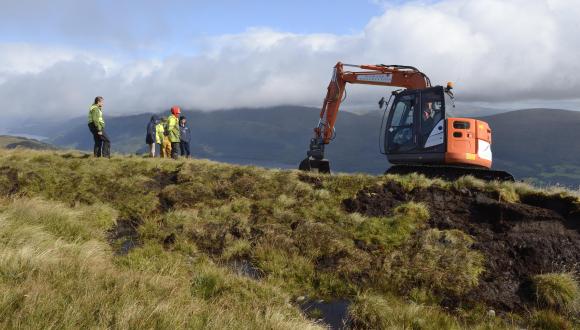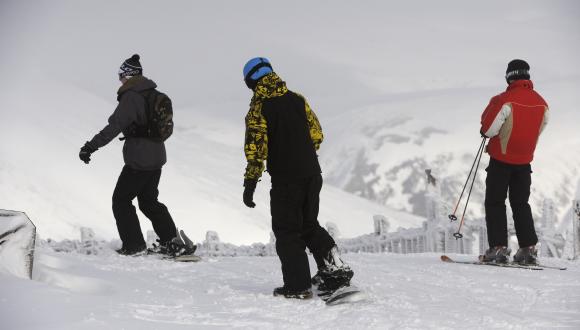Nature-based jobs and skills Action Plan 2023-2024
Introduction
Nature based solutions provide an essential response to the climate and biodiversity crises. The IUCN (International Union for Conservation of Nature) estimates that over 30% of emissions can be addressed through nature based solutions. Evidence shows that the workforce required to implement the nature-based solutions we need to support net zero by 2045 is currently insufficient in terms of numbers and skills. To begin to address this, we published an initial Action Plan in July 2021.
This updated plan reflects progress up to April 2023 and highlights actions for 23/24. The over-arching context for this work is provided by NSET (National Strategy for Economic Transformation), CESAP (Climate Emergency Skills Action Plan), the current and emerging Scottish Biodiversity Strategy (SBS) and the principles of the Just Transition. As with the initial plan, the updated Action Plan does not attempt to capture all activity within the nature based sector but to focus on areas where there are specific gaps, where progress is possible in the short-term and where NatureScot can add the most value. We will publish summaries of progress with these actions (and other relevant activities) every 12 months.
Context
Natural capital has been identified as one of the four wealth generators in Scotland’s green recovery, with research showing that investments in natural capital are one of the most effective ways to generate economic multipliers, create jobs and address climate change.
NatureScot’s initial assessment of nature-based jobs and skills* concluded that a clear focus on nature-based jobs (see Annex 1 for examples of nature-based jobs), their economic potential, workforce and skills requirements, is needed to enable the nature-based sector to play its part in providing fair work and tackling inequalities in a low carbon and green economy. It identified that the nature-based sector makes a significant contribution to the Scottish economy amounting to 195,000 jobs or 7.5% of Scotland’s workforce in 2019. Nature-based jobs grew at more than five times the rate of all jobs in Scotland in the period 2015-19 and accounted for one third of all job growth in Scotland in this period.
Significant further growth in nature-based jobs is anticipated on the back of expansion in activities required to meet our net zero targets. Between now and 2030, growth in nature-based sectors such as peatland restoration, green infrastructure, woodland creation & restoration and blue carbon is expected to be significant, particularly given the increased recognition of nature-based solutions in the Climate Change Plan Update.
Our Corporate Plan ambition sets the broad context and timescale for our work as follows:
- By acting now we will promote understanding and awareness of skills and capacity needs for the nature based sector.
- By 2026, skills needs for the nature based sector are mainstreamed and aligned with skills policy, planning and delivery partners
- By 2030 sufficient skills and capacity for the nature based sector are in place to implement nature based solutions.
Summary
We identify four priority themes where we can add value, and where there are evident gaps:
- Strategic Engagement – to work with stakeholders to help identify and support the mainstreaming of skills required for the implementation of nature-based solutions across the Scottish economy.
- Engaging and inspiring young people – to support and empower young people gaining skills and accessing employment in nature-based sectors. This includes providing opportunities for regular and frequent contact with nature throughout their school career. Co-design with young people and educators will play an important part in developing the action needed.
- Understanding demand – work to better understand current and future skills gaps and shortages including at a regional level and in key sectors. This will help ensure that that skills relevant to implementation of nature-based solutions are being developed and supported throughout a range of disciplines.
- Supporting skills development– to lead a collaborative approach to addressing skills shortages in nature restoration to support a just transition to a low-carbon economy.
Progress 22/23
Highlights include the following:
- Contributed to the Commission for the Land-based Learning Review (CLLR). Supported Scottish Government colleagues with the CLLR Report. CLLR Report to Ministers published and included recommendations to increase outdoor learning in schools and provide additional support to learning provision that supports nature restoration.
- Working with Rivers graduate placement scheme 23/24 - in partnership with Graduate Career Advantage Scotland (GCAS) ten graduates were placed with nine employers.
- “Nature-restoration skills and jobs online conference” (What Jobs and Skills do we need to restore Scotland’s Nature?) on March 13. 185 people attended with good participation from our primary audience of educators, careers advisors, policy makers and the nature-based sector.
- Nature Restoration Skills Week (week beg. 13 March). A programme of talks, events, webinars and training to support the development of new nature-based skills. 20 separate online and in-person events were delivered and over 500 people participated.
- The Peatland ACTION training programme has provided training to 489 individuals in 2022/23. These include 37 landowners, 48 contractors, 52 people involved in scheme designer and project management and approximately 30 students.
- A new course in Peatland Restoration Design was developed at SRUC and 2 cohorts, each of 15 candidates, completed at the end of March 23.
- Commissioned and completed Deer Management Skills & Capacity Initial Scoping Report March 2023.
- Secured funding from ‘New to Nature’ scheme for a year-long placement at Ben Eighe NNR. The scheme offers new, full-time, temporary work placements in nature and landscape organisations across the UK, aiming to increase diversity and enrich the environmental sector.
- Joined the Make Your Mark campaign to collaborate with others to increase the number and diversity of nature volunteers in Scotland.
Action Plan 23/24
Provide advice and leadership
Action
- Contribute to Climate Emergency Skills Action Plan Update.
- Contribute to preparation of the Just Transition Plan for Agriculture and Land Use .
- Support Skills Delivery Landscape Review (the Withers Review) as required.
- Participate in the Skills Action Plan for Rural Scotland (SAPRS) Implementation Group
- Work with eNGOs and others on initiatives to support a pipeline of nature-based skills and jobs.
Careers advice
- Engage with careers advisory networks to support development of advice and professional learning on careers in developing and emerging nature-based sectors.
Pathways into Nature-based sectors
- Develop information and graphics showing the progression pathway into nature-based sectors through the education and skills system.
- Support pathways into Countryside Ranger Jobs.
- Develop NatureScot STEM Strategy and resources to support learners.
Volunteering
- Explore ways to connect a diverse range of potential volunteers with volunteer opportunities in NatureScot and more widely across the nature-based sector, through engagement with the Make Your Mark volunteering network.
Inspiring Young People through Outdoor Learning
- Promote and support regular, frequent and high quality outdoor learning experiences and connection with nature for all children and young people 3-18. This includes a progression of place based experiences from local sites to special places for nature.
- Provide professional learning for educators to highlight learner pathways in the nature-based sector.
- Provide resources and information to pupils, schools, and the wider school community about opportunities in the nature-based sector and the skills required.
Learning Frameworks
- Help raise the level of climate and nature literacy in young people and inspire more to take up nature-based employment.
- Support the Apprenticeship Development Programme for the nature-based and land-based Apprenticeships
Evidence gathering
- Work with Scottish Government Centres of Expertise and others to identify evidence gaps and to scope and commission research to fill gaps.
Equality, Diversity & inclusion (EDI) within nature based sector - partnership to action change
- Use our reputation and influence to lead on and advocate for improving EDI in the nature-based sector.
- Ensure EDI in all aspects of our projects and those we support or fund, and influence others to do the same.
- Work with CEMVO and others to improve community engagement and identify opportunities for positive action to increase learning and employment opportunities in the nature-based sector for minority ethnic people.
- Support New to Nature Placement(s) and evaluate success.
Development of skills in green finance for the implementation of nature-based solutions
- Engage with land managers to promote and support understanding of nature based finance opportunities.
Trial new approaches to upskilling in sectors where climate and nature actions will require new skills
- Evaluate the success of the 2023 Working with Rivers Training Placement Scheme cohort.
- Devise and deliver a Nature Restoration Skills Programme for 23/24 with stronger links to SBS vision for nature.
Capacity in advisory services in relation to nature and climate advice
- Working with partners and stakeholders, identify any training needs and opportunities for skills and knowledge development in regenerative agriculture and agro-ecology.
Supporting the development of skills for peatland restoration
- Support crofting communities to enable them to engage more actively in Peatland Action
- Develop training capacity and training the trainer capacity.
- Develop peatland restoration design capacity
- Develop contractor capacity.
- Support talent attraction and develop and secure future workforce.
Integrate skills and training into NatureScot activity
- Develop the role of National Nature Reserves in the provision of land-use skills and training
- Explore the role of the Nature Restoration fund in supporting skills development, training and volunteering.
- Explore how NRF might support skills and training
Annex 1 - A Sample of Nature-based jobs for net zero
|
Sectors |
Roles and skills |
|---|---|
|
Green finance The financing needed for nature based solutions to the climate emergency and other societal problems |
|
|
Investing in nature based solutions - Investment in nature-based solutions can deliver carbon reductions at a fraction of the cost of engineered solutions, at the same time as enhancing natural assets and delivering a range of ecosystem services. |
|
|
Transforming land use and future rural support - the Committee for Climate Change highlights the need for transformative land use change if Scotland and the UK is to meet its climate change targets. |
|
|
Urban Green Infrastructure and active travel targeted at improving disadvantaged areas makes our towns and cities more attractive for people to live and work in, and attracts jobs, businesses and investment |
|
|
Nature based tourism makes up about 40% of all tourism in Scotland, contributing £1.4bn to the Scottish economy, supporting approximately 40,000 jobs. Tourism is one of the key sectors that has been heavily impacted by Covid 19. |
|
|
Sustainable marine management |
|





